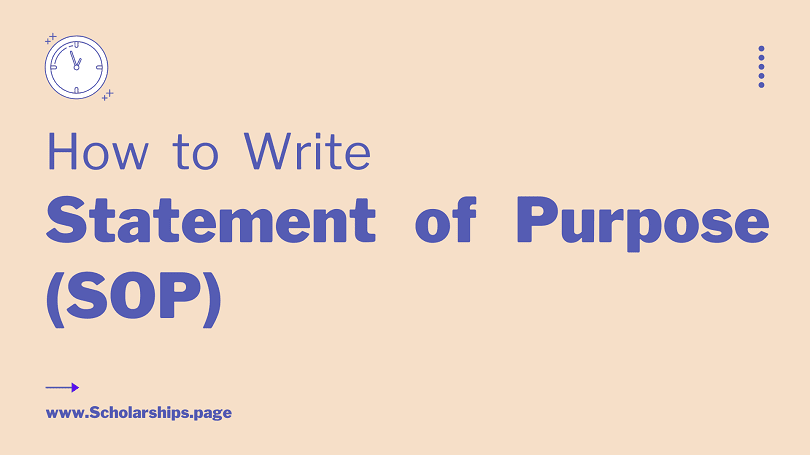
The Statement of Purpose abbreviated as ‘SOP’ is also known as the statement of research, personal statement, or the letter of intent (LOI). The statement of purpose (SOP) speaks about the interest inclination of the candidate towards a job opportunity, scholarship, contract, or business deal.
The Statement of Purpose (SOP) for scholarship application speaks about the candidate’s academic interests, academic achievements, professional and research work contributions, goals, and motivation factors.
Of all the academic documents that you need to submit for admission to a university or to get a scholarship, a statement of purpose (SOP) can turn out to be the most mind-numbing to write. In a statement of purpose (SOP), you are supposed to talk about yourself and your inclined interest towards milestones without sounding like you are blowing your own trumpet.
You have to assure the admissions or scholarship committee that you are the perfect candidate for this position and how this course is going to help you achieve your academic and professional ambitions.
Parts of a Statement of Purpose (SOP):
A statement of purpose (SOP) should follow the following format or should have the following four parts:
- Start off with a Compelling Introduction:
You have to make a gripping introduction by stating some interesting facts about yourself. You can quote something that somebody said that absolutely applies to your situation. This would make the recipient want to go on and read the whole document. It is not easy to make a good first impression, so be patient while you work on your initial paragraph. If your first paragraph is filled with generic information or lousy writing, you will leave your reader with a kind of negative impression that can be impossible to through off.
- Summarize your Academic Career:
In this section, you will talk about the previous study programs that you have undertaken (undergraduate or master’s) and how it is affecting your decision of taking up this particular program or course.
You are also supposed to go into details of the research that you may have done in your previous degree program/s. You can state your achievements like any paper that you have published; any breakthroughs that you have encountered etc. Try to be modest while highlighting all these aspects. It leaves your impression on the admissions committee as a humble person.
- Discuss any recent and relevant activities or achievements:
If you have been studying or working before applying for your master’s or Ph.D. program, do mention your responsibilities, achievements, your work area (profit or not-for-profit), your work team, your leadership capabilities (with concrete detail), as a student or employee. You have to link all those details to why you are undertaking post-graduate studies. It can be the expansion of knowledge or the expansion of professional opportunities.
- Elaborate your educational interests:
Finally, state why you want to study a particular course in a particular university? Go into enough detail so as to convince the decision-makers that you understand the importance of the work that they are doing as well as the researches that they undertake. Indicate what areas of research you are interested in as well as the brief methodology of how you would go about actually doing it. You have to sound like you absolutely know what you are talking about.
Go onto the university’s website and see what professors in your potential area of study are working on. Is their research aligned with yours? If so, mention it with enthusiasm.
Finally, finish off your statement of purpose SOP on a positive note stating how much importance it holds for you to get into this particular program.
Important Tips for Composing a Statement of Purpose (SOP):
- The admissions department is looking for a candidate who is self-motivated, competent, and ambitious. Be sure to keep that in mind and craft your SOP accordingly.
- Use active sentences instead of passive sentences. Being passive shifts the focus of the sentence.
- Use concrete data, facts, and figures to prove your worth. Just saying that you are ambitious is not enough.
- If you have faced any obstacles during the course of your studies or employment like any illness, or financial crunch, mention it in a positive way. Show your patience and perseverance during tough times.
- Keep the word limit in mind and follow it. If you have not been given a word limit, keep the statement of purpose between 500 to 1000 words.
- Be focused and link everything to the other. In other words, do not go off track.

